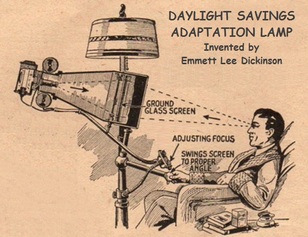
However, the Daylight Savings plan that congress ultimately adopted was NOT exactly as Dickinson had proposed it.
Dickinson loved corn -- hence his interest in and concern for farmers in the field -- but he also loved sleep. Therefore, Dickinson's plan was not to "fall back" one hour in October and then "spring forward" in March, because with this plan we all lose an hour of sleep in the spring. No, Dickinson's plan preserved our sleep, AND it gave us extra day for the weekend. Here's what he proposed:
* "Fall back" one hour in October.
* Then "fall back" twenty-three hours at midnight on a Saturday in early March to give us an extra Saturday, and thereby giving us a three-day weekend.
Wouldn't this give us an extra day in the year? No, because Dickinson proposed giving up August 31st , "who needs that date anyway?" he wrote.
Of course, Congress did not adopt Dickinson's plan as proposed because Speaker of the House J. Warren Keifer's mother's birthday fell on August 31st!
Dickinson wrote a short poem about the adopted plan ("fall back" one hour in October and "spring forward" one hour in March) called "Oh, honey of an hour." His poem inspired third cousin Emily to pen a poem by the same name. Both poems are below:
| By Emmett Lee Dickinson: Oh, honey of an hour, I never knew thy power, Till springtime’s leap Now I’m drowsy and dour, And more frequently sour, Since I lost sleep. | By Emily Dickinson: Oh, honey of an hour, I never knew thy power, Prohibit me Till my minutest dower, My unfrequented flower, Deserving be. |
Dickinson was distraught by congress' bungling of his plan as was much of the general public! He had never intended for anyone to lose any sleep over this shift in hours. Also, Dickinson pioneered the research on Seasonal Affective Disorder (SAD), so he knew of potential issues with the shifting of hours and sunlight.
As a result of the adopted DST plan, Dickinson invented the Daylight Savings Adaptation Lamp (pictured above). This device allows individuals to anticipate and acclimate to the shift in sunlight hours so that they do not become "drowsy and dour, and more frequently sour."
 RSS Feed
RSS Feed
